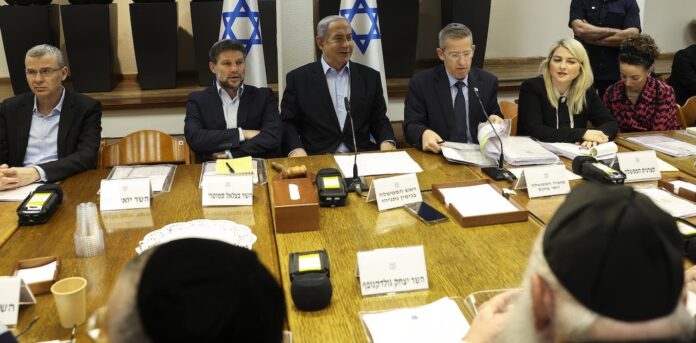Benjamin Netanyahu’s biggest problem in negotiating an end to war with Hamas and Hezbollah may be his own government
By Amnon Aran, City, University of London
Three months since Hamas launched its murderous October 7 attacks, Israeli foreign policymakers remain far from achieving their goals.
The Israel Defense Forces’ (IDF) military campaign in the Gaza Strip has been unrelenting. According to data provided by the Hamas-run health ministry, more than 22,000 thousand Palestinians have been killed, the majority of them civilians. Meanwhile the physical destruction in the Gaza Strip has been catastrophic.
But despite the massive use of military force, the strategic goals Israel needs to achieve if it is to meet its aim of dismantling Hamas’ military capabilities and its ability to govern the Gaza Strip, remain elusive.
Apart from Saleh al-Aruri, a key member of Hamas’ politburo, who was assassinated in Beirut on January 2, Hamas’s senior leadership remains intact.
In addition, Hamas’s command and control systems stay operational. While its military capabilities have been weakened, Hamas retains the capacity to launch missiles on Israeli communities and exact casualties from the IDF.
What’s more, the hope of the Israeli war cabinet that the military pressure inflicted by the IDF on Hamas will yield a second deal to free Israeli hostages has yet to materialise.
Across its northern border with Lebanon, Israel faces an even more formidable challenge. Since the October 7 attacks, border skirmishes with Hezbollah have become routine. These have posed a continuous threat to Israeli towns, villages and kibbutzim situated along the border with Lebanon.
Consequently, at least 70,000 residences south of the border have been evacuated, which has brought the overall tally of Israeli evacuees to at least 125,000 people. They have been living in hotels and temporary accommodation funded by the state.
As Israeli military deterrence has failed to keep Hezbollah out of the Israel-Hamas war, the government has yet to announce when the evacuees will be able to return to their homes, many of which have been destroyed by Hezbollah attacks.
The challenges Israel has encountered in its war with Hamas and conflict with Hezbollah have underscored the limits of what it can achieve with military force alone. It has become clear that Israel will have to rely on a multilateral diplomatic-political framework if it is to achieve its aims vis-à-vis Hamas and Hezbollah.
International efforts
Only an international coalition can restore the Gaza Strip into a habitable place that does not pose a renewed security threat to Israeli communities. This will need to include a credible Palestinian partner, backed politically and financially by Arab and western countries and international organisations.
Similarly, averting a full blown Israel-Hezbollah war rests for now on American and French diplomacy producing an agreement that will prevent the outbreak of a full blown conflict. In this context the US, with the support of France, has been exploring a deal that would tend to some “unfinished business” following the war Israel and Hezbollah fought in 2006.
According to the framework being explored, negotiations would commence upon a new land demarcation agreement that could delineate where and how the two sides deploy forces across the Israel-Lebanon border.
In addition, in line with the United Nations Security Council resolution 1701, which was part of the agreement that ended the 2006 Israel-Hezbollah war, the Lebanese army rather than Hezbollah would be deployed in southern Lebanon. Hezbollah would, in turn, redeploy to an agreed point north of the border with Israel.
Will diplomacy succeed?
But Israeli domestic politics constitutes a serious obstacle. The political and personal future of the Israeli prime minister, Benjamin Netanyahu, who is standing trial on several corruption charges, depends upon a coalition of 64 members of the Israeli parliament. This includes the extreme right Religious Zionism party.
Its leaders, national security minister, Itamar Ben Gvir, and finance minister, Bezalel Smotrich, flatly reject any cooperation with the Palestinians. They are also unlikely to support even minute territorial adjustments across the Israeli-Lebanese border that they would perceive as concessions to Hezbollah.
As a result, they are poised to reject the multilateral diplomatic formulas being explored in relation to the “day after” in the Gaza Strip and the efforts to avert a war with Hezbollah.
This uncompromising stance presents Netanyahu with a serious dilemma. He can resist the diplomatic initiatives towards the Gaza Strip and Hezbollah to keep his political base and government intact. This could enable him to delay and perhaps even stop his trial.
But catering for his political base, which is likely to scupper diplomacy, may prolong Israel’s military presence in the Gaza Strip. It could also lead to an extremely costly war with Hezbollah and erode the crucial support the US has provided Israel since October 7.
The alternative would be to try to replace the far-right elements of the government via a deal with a centrist party, which could accommodate the diplomatic initiatives being explored. But this is personally and politically extremely risky for Netanyahu. It also seems unviable since the leader of the Israeli opposition, Yair Lapid, has already called for Netanyahu’s resignation.
The quip by the late Henry Kissinger, that Israel has no foreign policy, only domestic politics, seems to be playing out yet again. And, as so often in the past, it’s presenting the country’s leaders with an acute foreign policy predicament.![]()
Amnon Aran, Professor of International Relations, City, University of London
This article is republished from The Conversation under a Creative Commons license. Read the original article.



